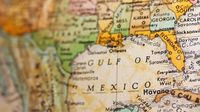In a significant legal move, the president of Mexico, Claudia Sheinbaum, announced on Friday, May 9, 2025, that her government has filed a lawsuit against Google for changing the name of the Gulf of Mexico to the 'Gulf of America' on its Maps platform for users located in the United States. This unprecedented action reflects rising tensions between national sovereignty and the influence of major tech corporations.
Sheinbaum emphasized that the lawsuit is not aimed at preventing the name change itself but rather ensuring that it complies with a decree issued by the U.S. government, which should only apply to the U.S. portion of the gulf. "This has already been filed, and there has been an initial resolution; we are now waiting," she stated during her morning press conference.
The controversy began on January 20, 2025, when then-President Donald Trump signed an executive order mandating the renaming of the Gulf of Mexico to the 'Gulf of America' in all official U.S. documents and maps. According to the proclamation, this change was intended to reflect the region's significance to the United States. The decree specified that the new name would apply to the continental shelf area of the U.S., which is bordered by Texas, Louisiana, Mississippi, Alabama, and Florida, extending to the maritime boundary with Mexico and Cuba.
In February 2025, in response to Trump's order, Google altered the nomenclature on its mapping service for U.S. users. This decision did not sit well with the Mexican government, which viewed it as a violation of its sovereignty. "Google is wrong to show areas that geographically do not belong to the U.S. as 'Gulf of America'," Sheinbaum argued. She insisted that Google should label the area correctly, stating, "We demand that Google show 'Gulf of America' where it is indeed part of the U.S. territory, and 'Gulf of Mexico' for the areas that correspond to Mexico and Cuba. That is what we are demanding to be reflected on the platform."
In March 2025, the Mexican government had previously attempted to take legal action against Google for moral damages, but this lawsuit was dismissed by a judge who ruled that the name change did not constitute a financial harm to the nation. However, Sheinbaum's administration is optimistic about the current lawsuit, claiming to have received a favorable initial ruling, although details have not been disclosed.
On the same day as Sheinbaum's announcement, the U.S. House of Representatives passed a bill that supports Trump's executive order. The legislation, which passed with a narrow vote of 211 to 206, mandates that federal agencies update all maps and documents to reflect the name 'Gulf of America'. This bill, sponsored by Representative Marjorie Taylor Greene, a close ally of Trump, further complicates the situation as it seeks to solidify the name change across federal documentation.
Sheinbaum responded to the congressional decision, stating, "We will see how this resolution from Congress turns out; but they can only name the part that corresponds to the territory of the United States." She reiterated that while the U.S. has the right to designate names within its territory, it cannot unilaterally rename maritime areas that are under the jurisdiction of Mexico or Cuba.
The ongoing dispute has sparked outrage in Mexico, where many citizens hold a negative view of Trump and his administration's actions. Polls indicate that Sheinbaum's measured approach to the situation has resonated positively with the public, as she navigates the complexities of international relations with a powerful tech giant.
"What we say is: 'Google, adhere to what the U.S. government has approved'," Sheinbaum remarked, emphasizing the need for adherence to international norms regarding territorial waters. The president highlighted that while the U.S. can change names for its regions, it cannot extend that authority to areas that belong to other nations.
This legal battle could set a significant precedent regarding official toponymy in the digital age, especially concerning how large tech platforms manage geographical data. If the Mexican government succeeds in its lawsuit, Google may be required to implement dual geographic databases, distinguishing the name of the Gulf based on user location. Such a move would necessitate substantial technical adjustments on Google's part.
As the situation unfolds, the implications of this case may resonate beyond the immediate conflict, potentially affecting how digital platforms operate in a global landscape where national sovereignty and corporate power often collide.





